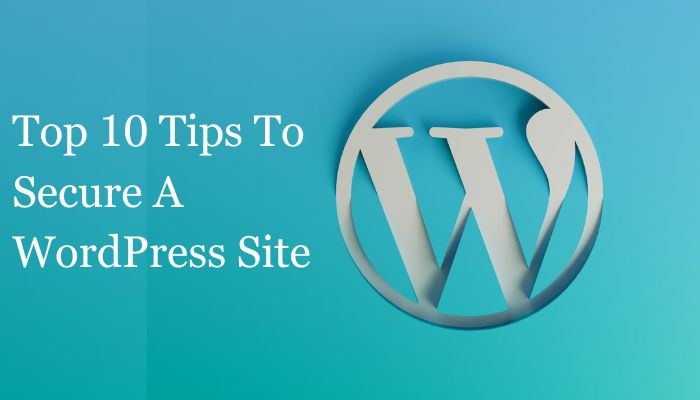Locking your doors at night is similar to securing a WordPress website. You wouldn’t just throw open your front door, would you? Your SEO agency is subject to the same rules. Threats abound in the digital realm, from viruses that can infiltrate through out-of-date plugins to hackers searching for weaknesses. Let’s get started with some crucial actions to maintain the security of your WordPress website.
Regular Updates: The First Line of Defence
It’s important to keep your WordPress website updated. Consider it like purchasing the newest security gear for your house. Along with new features and enhancements, security patches are frequently included in updates for all versions of WordPress, including those for themes, plugins, and the core program. Disregarding these updates is equivalent to disobeying a recall notification for a car component that could stop a future malfunction.
Why Updates Matter
Updates do more than merely offer more features. They often address security flaws and problems that hackers may exploit. Maintaining your present status is like posting a “No Trespassing” sign for potential assailants.
Developing the Habit of Updating
Establish a routine for checking for updates. To make things easier, the majority of hosting services offer notifications or even automated upgrades. Recall that, just as routine maintenance keeps a car dependable, the objective is to maintain everything operating safely and smoothly.
Strong Passwords and User Permissions: Your Security Gatekeepers
The keys to your digital kingdom are your passwords. It is similar to having a high-quality lock on your door to use strong, one-of-a-kind passwords. It serves as your initial line of protection against unwanted access. Having a good password is important, but so is knowing who has access to your website.
Creating Robust Passwords
A strong password is long, complex, and made up of different letters, numbers, and symbols. Use of information that may be guessed, such as your name or birthday, is not advised. You don’t need to remember every strong password because programs like password managers can create and store them for you.
Managing User Permissions
Not everybody needs your site’s master key. By defining roles and permissions, WordPress enables you to manage the capabilities and limitations of users. Contributors, for instance, are able to compose and edit their posts but not alter the site’s configuration. In this manner, you lower the possibility of inadvertent or deliberate misuse by limiting access based on necessity.
The Invisible Shield: Setting Up a Web Application Firewall (WAF)
Let’s explore the realm of Web Application Firewalls (WAF) now. Just picture a bouncer controlling entry and exit at a nightclub. That is the function of a WAF on your website. It keeps an eye on incoming traffic and stops efforts at hacking to protect your website from internet dangers. Although installing a WAF may seem like a job best left to the IT crowd, it’s actually rather simple. Since many security plugins offer WAF services, adding this additional layer of safety to your WordPress website is easy. You may successfully defend your website from the numerous cyber threats that are constantly lurking in the shadows of the internet by setting up a WAF.
Implementing Two-Factor Authentication: An Extra Layer of Security
In this exploration of how to secure WordPress site, let’s speak about two-factor authentication (2FA), a straightforward yet effective approach to increase the security of your WordPress website. Despite adding a step to the login procedure, this method is revolutionary in avoiding unauthorised visitors. Consider it as your front door’s double lock. Even if someone can figure out your password, they will run into trouble if they are unable to supply the code needed for the second verification step, which is often created by an app or delivered to your phone. Despite its technical sound, setting up 2FA is rather simple. There are many plugins out there that can help you navigate the process and make sure that protecting your website doesn’t have to be a hassle.
Hardening WordPress: Beyond the Basics of Security
It’s simple to concentrate on the essentials when discussing WordPress site security, such as updates and passwords. Let’s examine in more detail what it means to actually fortify WordPress against such attacks. This procedure entails going above and beyond standard guidance, focusing on your site’s structural integrity to strengthen it against assaults.
Limiting file editing within the WordPress dashboard is one useful tactic. By preventing direct editing of plugin and theme files, you lower the possibility that a hacker would introduce dangerous code once they have access. It’s a small adjustment that may significantly affect the security of your website.
Safeguarding your wp-config.php file is an additional essential step. Important details regarding your WordPress installation are contained in this file. It may be kept safe from prying eyes by moving it outside the root directory or by granting stringent file permissions. It is analogous to locking up your treasures.
Attackers may also be prevented by altering the database prefix from the standard “wp_” to something different. It’s similar to altering your locks in that it will make it more difficult for hackers who depend on guessing popular table names to access your data.
Secure Socket Layers (SSL) Certificates: Encrypting Data to Protect Integrity
Let’s now discuss SSL certificates. These are the unsung heroes of website security; they encrypt data between your website and the browsers of your users in the background. Hackers find it extremely difficult to intercept important data, such as login credentials or personal information, thanks to its encryption. If you’ve ever noticed a padlock icon next to a website’s URL, it means that SSL is in use. Getting an SSL certificate was once hard and often costly, but that is no longer the case. These days, many hosting providers offer them for free, and setting one up only requires a few clicks. A tiny amount of work results in a big increase in security and reliability.
Stay Alert with Security Scans and Monitoring
Frequent security checks serve as your virtual eyes and ears. They are able to identify possible dangers before they materialize into issues. Imagine it as having a security guard watch over your website all the time, searching for anything suspicious.
It’s also crucial to set up notifications for strange activities. You’ll be alerted as soon as something strange occurs, such as an unexpected modification in your files or a sudden rise in traffic. You can take immediate action in response to this prompt notice, which can halt an assault in its tracks.
Regular Backups: Your Safety Net Against Data Loss and Attacks
We must not undervalue the significance of frequent backups. Imagine devoting several hours to your website, just to have it all destroyed by a careless click or hacking assault. Tragic, huh? Backups can help in this situation. They serve as a safety net, enabling you to return your website to its initial configuration in the event of an issue. The finest aspect? It is simple to automate backups. It saves you time and effort by scheduling backups, which is something that many hosting providers and plugins offer. Consider backups as your website’s insurance policy. Although you hope not to need it, you’ll be happy it’s available if you do.
Knowledge Is Power: Educate Yourself and Your Team
It’s important to keep up with security best practices. The strategies used by individuals seeking to take advantage of weaknesses are always evolving, much like the digital environment. You can equip yourself with the information required to secure your website by staying up to date on the most recent security news and advice.
Ensuring that everyone who has access to your WordPress website is similarly educated is also crucial. The weakest link in a chain determines how powerful it is. Good security practices by all users make your website far more difficult to hack.
Choosing the Right Hosting Environment: Security from the Ground Up
The hosting environment is the cornerstone of a safe WordPress website. Selecting a host that has an emphasis on security may make a big impact on your SEO agency because not all hosts are made equal. Seek out servers that provide features like real-time security monitoring, support for the most recent versions of PHP, and automatic upgrades.
Strong defenses against frequent threats, including DDoS assaults, and reliable backup options are further features of a quality host. This degree of assistance serves as a safety net, allowing you to relax and concentrate on what you do best.
Read Also – 10 Best SEO Companies In Singapore 2024



